Hundreds of angry migrants demonstrated outside Budapest's Eastern Railway Terminus on Tuesday, demanding they be allowed to travel on to Germany.
The biggest ever influx of migrants into the European Union has left its asylum policies in tatters.
Around 1,000 people waved tickets, clapping, booing and shouting "Germany! Germany!" outside the station. Later they sat down, staring at a police blockade erected at the entrance.

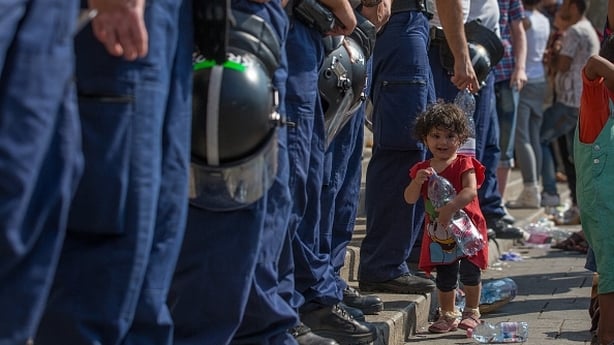
A refugee crisis rivalling the Balkan wars of the 1990s as Europe's worst since World War Two has polarised and confounded the EU, which has no mechanism to cope with the arrival of hundreds of thousands of poor and desperate people.
Germany is likely to accept by far the largest share.
In the case of those fleeing the Syrian civil war it has effectively suspended an EU rule that asylum seekers must apply in the first EU country they reach.
But it insisted today that the rule was nevertheless still in force and urged other EU countries to abide by it.
The vast majority of refugees fleeing violence and other migrants escaping poverty arrive on Europe's southern and eastern edges but are determined to press on and seek asylum in richer and more generous countries further north and west.
That means illegally crossing a bloc that has no internal border controls to stop them.
Hungary has emerged as one of the main flashpoints of the crisis as the primary gateway for migrants travelling over land through the Balkans and into the EU.
Hungarian authorities shut the Budapest train station altogether today, then reopened it but barred entry to migrants.
About 100 police in helmets and wielding batons guarded the station. Dozens of migrants who were inside were forced out.
Hungary's decision to bar the migrants from westbound trains was a reversal from the previous day, when Hungary and Austria let trainloads of undocumented migrants leave for Germany, a violation of EU rules they now have little power to enforce.
European laws, known as the "Dublin rules", require asylum seekers to apply in the country where they first enter the EU and remain there until their applications are processed, even though the 26 members of the bloc's Schengen zone maintain no border controls between them.
The countries where most first reach the bloc - Italy, Greece and Hungary - say they have no capacity to process applications on such a scale.
Germany announced last month it would allow Syrians arriving from elsewhere in the EU to apply for asylum without being sent back to the country where they entered the bloc.
It insisted today that this did not change the law, and other states must demand migrants register where they arrive.
Other countries, including Austria, have demanded clarification from Berlin.
Meanwhile, German Chancellor Angela Merkel has said refugees fleeing war or persecution should be distributed across the European Union according to the ability of member states to receive them.
However, at a joint news conference in Berlin, the Spanish prime ministers Mariano Rajoy said that Spain was not prepared to take more than the nearly 2,800 it had already pledged to accept.
Chancellor Merkel has called for a new common asylum system - at present all 28 member states have their own rules on who can and cannot enter their country.
The Commission will bring forward new proposals that will probably include a binding quota of refugees, which each country will have to accept, based on a number of criteria.
The vast majority of refugees fleeing violence and other migrants escaping poverty arrive on Europe's southern and eastern edges but are determined to press on and seek asylum in richer and more generous countries further north and west.
That means illegally crossing a bloc that has no internal border controls to stop them.
Biggest daily number of migrants arrive in Vienna
Meanwhile, a total of 3,650 migrants reached Vienna by train yesterday, this year's biggest daily number, Austrian police have said.
It comes as a results of Hungarian authorities allowing people stuck in makeshift refugee camps to leave Budapest despite many not having EU visas.
"We are still in the process of verifying how many of them are actually asylum-seekers," Austrian police spokesman Patrick Maierhofer told AFP.
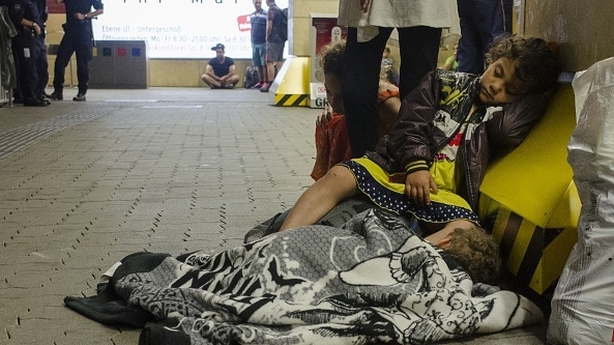
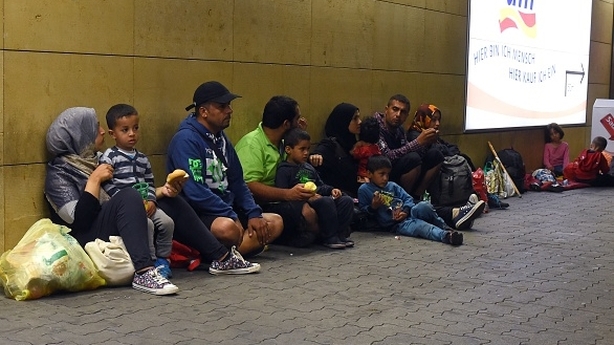
Scores of migrants, mostly Syrian, trekked several kilometres along railway tracks to cross into Hungary from Serbia yesterday.
The migrant crisis continues and large numbers of refugees continue to travel along the Balkan route toward western European countries.
They are transported by buses to the village of Horgos in northern Serbia, only a few kilometres from the border.
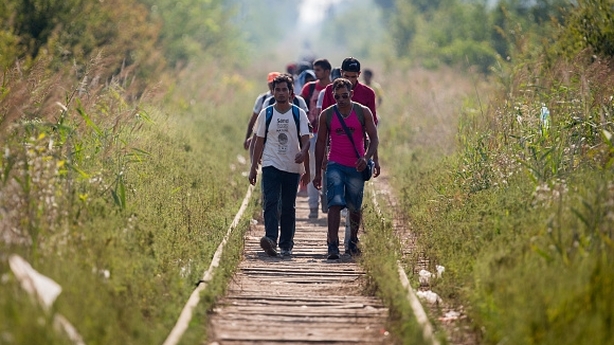
There they take a quick rest and continue on foot by walking along a railway track that cuts through the four-metre fence erected by the Hungarian authorities in an effort to stem the flow of people pouring into the country.
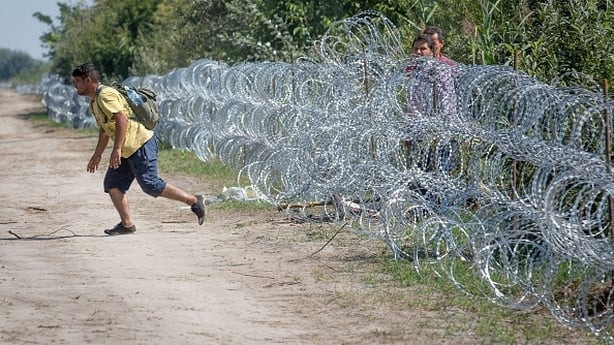
Although this is the last leg of their journey as Hungary's border marks the beginning of the EU's passport-free area, many fear they will be caught and escorted to a holding centre on the Hungarian side of the border.
As registering for asylum in Hungary would prevent them from settling in other, richer, countries in western Europe, migrants are keen to avoid police patrolling the area.
Images of migrants trying to escape being fingerprinted at a Hungarian refugee camp only to be taken back by police guarding the camp have caused concern among migrants, who complain about police treatment in Hungary.
The influx is a crisis for the European Union, which has eliminated border controls between 26 Schengen area states.
It requires asylum seekers to apply in the first EU country they reach - something that is often ignored as migrants race from the fringes of the bloc to its more prosperous heart.
Two more arrests over Austrian migrant truck tragedy
Austrian authorities said today police have made two more arrests over the discovery last week of 71 dead migrants in an abandoned truck on an Austrian motorway.
One man was arrested in Bulgaria and a second in Hungary, a prosecutor said.
There were no further details on those detained, which took to seven the number in custody over the tragedy, all but one of them arrested in Hungary.
Of the five previously held, four are Bulgarians and one is an Afghan.
Police believe they are low-ranking members of one of the numerous people-trafficking gangs that extract often large amounts of money from migrants to help them reach Europe.
The 71 victims included a girl aged one or two years old as well as three young boys. They were thought to be Syrians and to have suffocated up to two days before their discovery.
Migrants using fake Syrian passports to enter EU: Frontex
A market in fake Syrian passports has sprung up, particularly in Turkey, to help migrants and refugees enter the EU, the head of Europe's border agency Frontex has said.
"There are people who are in Turkey now who buy fake Syrian passports because they know Syrians get the right to asylum in all the member states of the European Union," Fabrice Leggeri told French radio station Europe 1.
"People who use fake Syrian passports often speak Arabic. They may come from North Africa or the Middle East but they have the profile of economic migrants," he said.
Mr Leggeri said there was no evidence that fake passports had been used by potential terrorists to enter Europe.
He repeated his call for additional EU border guards to help register migrants in Greece, one of the main entry points into Europe.
"Faced with the influx, registration systems are overwhelmed. We have an idea of nationalities, but not a clear picture of who is entering and the real profile of these migrants."
Mirroring recent comments from German Chancellor Angela Merkel, Mr Leggeri said the failure to share the burden among EU members would lead to the return of closed borders across the continent.
"The risk is growing every day. We are seeing more and more police patrols along interior borders (between EU countries)," he said.
"If the external borders cannot be managed with solidarity between member states, there is a risk that each state retakes control of its national borders, which would not be more effective."

